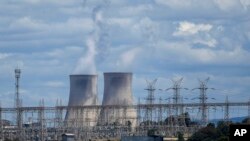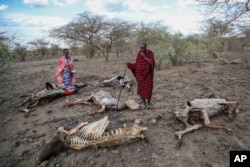A report by the World Meteorological Organization released Wednesday says efforts to stem climate change are at risk of going off the rails as greenhouse gas emissions reach record highs.
WMO's Greenhouse Gas Bulletin says global concentrations of carbon dioxide (CO2), the most important greenhouse gas, "in 2022 were a full 50% above the pre-industrial era for the first time."
Emissions of two other greenhouse gases, methane and nitrous oxide, also saw "the highest year-on-year increase on record from 2021 to 2022," it said.
The report, which is being issued in advance of COP28, the U.N. Climate Change negotiations scheduled for late November in Dubai, United Arab Emirates, says these new emissions grew in 2023 because of the continued rise of industrial activities.
"Out of those most important gases, carbon dioxide has contributed about two-thirds of the warming potential," said Petteri Taalas, WMO secretary-general. "The methane is a little bit less than 20% in its warming potential, and the nitrous oxide, which is the third gas, is responsible for 6%."
Taalas also said the importance of carbon dioxide could not be underestimated because "its lifetime is up to thousands of years."
"It takes thousands of years to remove carbon from the system once it is emitted to the atmosphere," he said, adding that the world is heading in the wrong direction despite decades of warnings from the scientific community.
"The current level of greenhouse gas concentrations puts us on the pathway of an increase in temperatures well above the Paris Agreement targets by the end of this century," he said. "This will be accompanied by more extreme weather, including intense heat and rainfall, ice-melt, sea-level rise, and ocean heat and acidification."
A report published Wednesday by British journal The Lancet warns the climate crisis threatens to unravel decades of progress in public health, "causing a devastating toll on lives and livelihoods."
The increasing destructiveness of extreme weather events jeopardizes water security and food production, The Lancet reports, "putting millions of people at risk of malnutrition."
More frequent heat waves and droughts, the journal states, were responsible for 127 million more people experiencing moderate to severe food insecurity in 122 countries, and that "a changing climate is accelerating the spread of life-threatening infectious diseases."
Scientists expect global temperatures to increase by 2.5 to 3 degrees Celsius by the end of the century, well above the Paris Agreement goal of limiting global warming to 1.5 degrees Celsius above pre-industrial levels.
"This climate change is not only a temperature issue, but it involves a wider change in our behavior in the atmosphere," said Taalas.
"Practically the whole planet has seen an increase in heat waves, about half of the planet has been facing an increase of flooding events and one-third of the planet has been facing an increase of drought," he said, noting that some countries in Africa have been hit with both droughts and flooding on an epic scale.
To mitigate the impact of climate change, he said Africa will have to emphasize climate adaptation.
"From our side, one of the powerful ways to adapt to climate change is to improve the early warning services … and many African countries have national adaptation plans," Taalas said. "For example, in countries like Ethiopia and Kenya, they have started using irrigation to boost their agriculture. And that is one way to adapt to climate change."
The WMO chief said more emphasis will be placed on climate adaptation when delegates gather for COP28. He said developing countries would like half of climate financing to be used to help them pay for early warning systems and climate adaptation projects.
A recent report by the U.N. Environment Programme estimates the costs of adaptation for developing countries to be between $215 billion to $387 billion per year this decade.
Taalas said it was difficult to predict what will happen at COP28, but that he felt somewhat more optimistic about the outcome in the aftermath of Wednesday's meeting between President Joe Biden and his Chinese counterpart, Xi Jinping.
"The fact that they have agreed to collaborate in the field of climate is good news. Let us hope that this enhanced potential for U.S.-China cooperation will lead to concrete results," he said. "The fact that the U.S. and China have started interacting is a positive sign because those big players, they can change the big scene."





